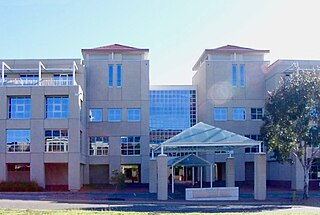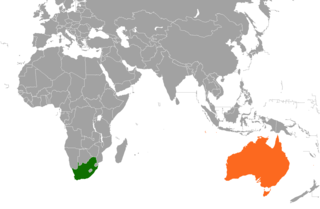 | |
Australia | Bangladesh |
|---|---|


Bilateral relations exist between Australia and Bangladesh.
 | |
Australia | Bangladesh |
|---|---|


Bilateral relations exist between Australia and Bangladesh.
Australia was the fourth country, and the first in the developed world, to recognise Bangladesh's independence in 1971. [1] A high commission was opened in Dhaka and relations have been warm since then. [1]
Australian Oil and Gas company Santos is a major investor in Bangladesh's natural resources sector. [2] In 2014 trade between the two countries crossed AUD 1 billion mark, of which 450 million came from Bangladesh's exports to Australia. Australia enjoying a surplus of AUD 160 million dollar on trade. [3]
High Commissioner of Bangladesh in Australia is Kazi Imtiaz Hossain as of 2015. [4] Previous high commissioner was Lieutenant General (retired) Masud Uddin Chowdhury. [5] VFS Global collects applications for Australian Visa in Bangladesh. [6] In 2016, Julia Niblett was appointed Australian High Commissioner in Bangladesh, preceded by Greg Wilcox. [7]
The two countries participate in joint military exercises. [8] [9]
The two countries are cricket Test playing nations and regularly compete against each other in tournaments, series and cricket world cup. [10] [11]
Australia and Bangladesh are one of the few countries that provide the option of third gender on their passports. [12] Australia Bangladesh Solidarity Network is a human rights organisation working for the garment workers in Bangladesh. [13]
India, officially the Republic of India, has full diplomatic relations with 201 states, including Palestine, the Holy See, and Niue. The Ministry of External Affairs (MEA) is the government agency responsible for the conduct of foreign relations of India. With the world's third largest military expenditure, second largest armed force, fifth largest economy by GDP nominal rates and third largest economy in terms of purchasing power parity, India is a prominent regional power and a potential superpower.

Foreign relations of Australia are influenced by its position as a leading trading nation and as a significant donor of humanitarian aid. Australia's foreign policy is guided by a commitment to multilateralism and regionalism, as well as to build strong bilateral relations with its allies. Key concerns include free trade, terrorism, refugees, economic co-operation with Asia and stability in the Indo-Pacific. Australia is active in the United Nations and the Commonwealth of Nations. Given its history of starting and supporting important regional and global initiatives, it has been described as a regional middle power par excellence.

The foreign relations of Bangladesh are Bangladesh's relationships with foreign countries. The Government of Bangladesh's policies pursue a moderate foreign policy that heavily relies on multilateral diplomacy, especially at the United Nations (UN) and the World Trade Organization (WTO). Since its independence in 1971, Bangladesh has stressed its principle of "Friendship towards all, malice towards none" in dictating its diplomacy. As a member of the Non-Aligned Movement, Bangladesh has tended to not take sides with major powers. Since the end of the Cold War, Bangladesh has pursued better relations with its neighbours and other nearby states.

The South Asian Association for Regional Cooperation (SAARC) is the regional intergovernmental organization and geopolitical union of states in South Asia. Its member states are Afghanistan, Bangladesh, Bhutan, India, Maldives, Nepal, Pakistan, and Sri Lanka. SAARC comprises 3% of the world's land area, 21% of the world's population and 5.21% of the global economy, as of 2021.

Bangladesh–India relations are the bilateral relations between the People's Republic of Bangladesh and the Republic of India, both of which are South Asian neighbours. Diplomatic relations between the two countries formally began in 1971 with India's recognition of an independent Bangladesh following India's military intervention helping Bangladesh secure independence following the Bangladesh Liberation War. On 6 December, Bangladesh and India celebrate Friendship Day commemorating India's recognition of Bangladesh and the continued friendship between the two countries.

Bangladesh and Pakistan are both South Asian Muslim-majority countries. Following the end of British rule in India, the two countries formed a single state for 24 years. The Bangladesh Liberation War in 1971 resulted in the secession of East Pakistan as the People's Republic of Bangladesh. Pakistan recognized Bangladesh in 1974. Today, bilateral relations between Bangladesh and Pakistan are considered to be cordial.

Bilateral relations exist between Australia and Pakistan. Former Pakistani President Pervez Musharraf having visited Australia in 2005, former Australian Prime Minister John Howard also visited Pakistan in 2005. In 2011, there were 30,000 Pakistani Australians.

The Commonwealth of Australia and the Republic of South Africa formally established diplomatic relations in 1947. Australia is home to one of the largest South African communities abroad with approximately 189,230 South Africans living in the country. Both countries are members of the Cairns Group, Commonwealth of Nations, G20, Indian Ocean Rim Association and the United Nations.

Foreign diplomatic relations between Australia and India are well-established, with both nations sharing a "Comprehensive Strategic Partnership" since both were part of the British Empire. Both are members of the Commonwealth of Nations, and share political, economic, security, lingual and sporting ties. Besides strong trading & migration, culture, arts, music, commercial & international sports like cricket, tennis, badminton have emerged as a strong cultural connection between the two nations. Military cooperation between Australia and India includes the regular joint naval exercise AUSINDEX.

Bilateral ties exist between Australia and the United Arab Emirates. The UAE maintains an embassy in Canberra whilst Australia has an embassy in Abu Dhabi and a consulate-general in Dubai.

Foreign relations between Bangladesh and Canada were established 1972. Canada is represented through its High Commission in Dhaka and Bangladesh is through its High Commission in Ottawa. Both countries are members of the Commonwealth of Nations and the United Nations. Bangladesh currently receives ~$110 million from Canadian official development assistance per year as of January 2014. It is estimated that around 36,000 (2012) Bangladeshi people live in Canada, primarily in cities like Toronto, Vancouver, Montreal, Calgary, Edmonton, and Ottawa.

The Deputy High Commission of Bangladesh in Karachi is a diplomatic mission of Bangladesh in Pakistan. It is located in Phase VI of the Defence Housing Authority in Karachi. The presently designated Deputy High Commissioner is S. M. Mahbubul Alam, who was appointed in 2021. The Deputy High Commission reports to the High Commission of Bangladesh in Islamabad.
![]() Media related to Relations of Australia and Bangladesh at Wikimedia Commons
Media related to Relations of Australia and Bangladesh at Wikimedia Commons